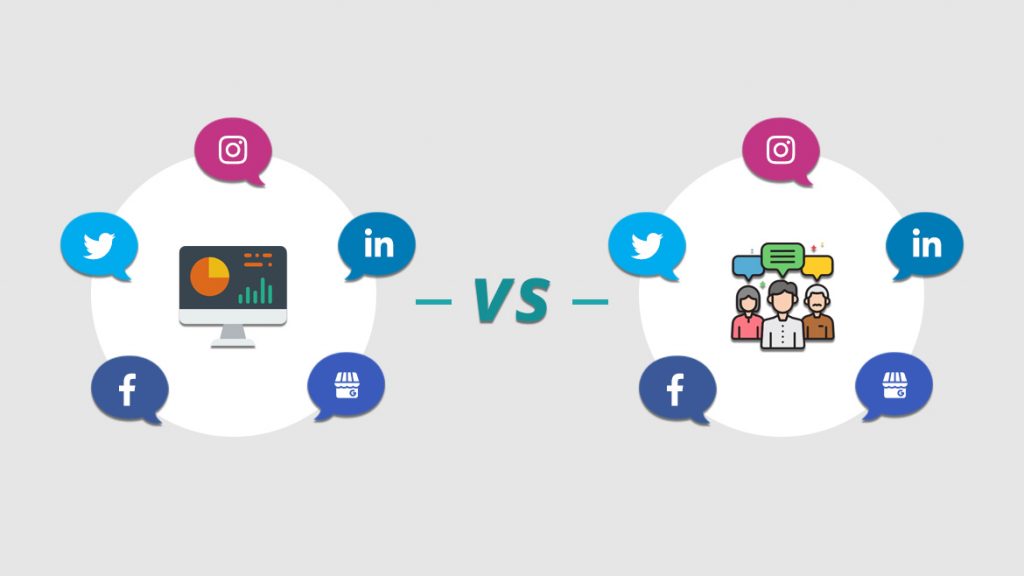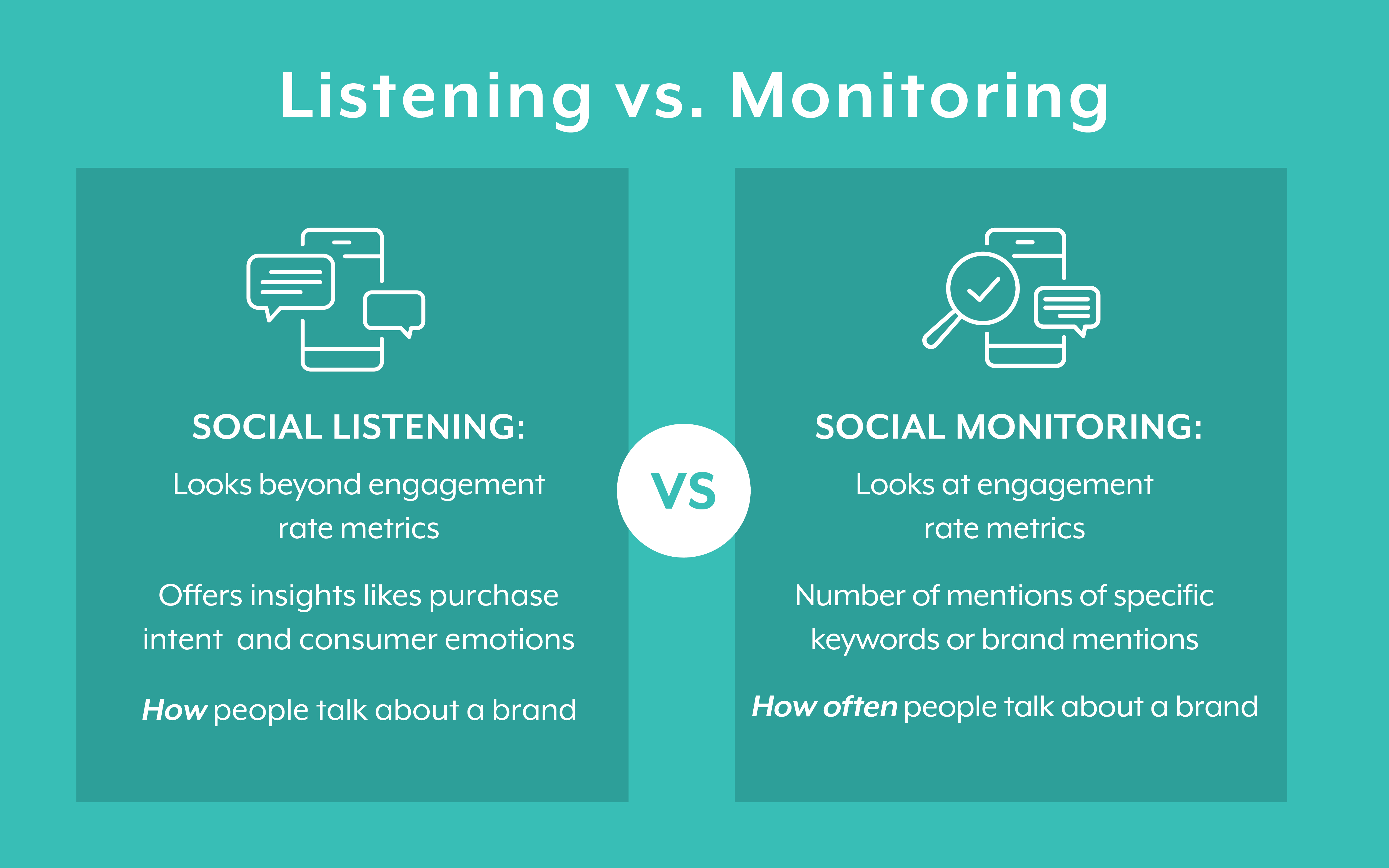In today’s digital age, businesses have access to an abundance of information through various online channels. Social media platforms, in particular, have become a treasure trove of valuable insights. Social listening and social monitoring are two essential practices that enable businesses to tap into this vast pool of customer data. This article will delve into the concepts of social listening and social monitoring, exploring their significance, benefits, implementation strategies, and more.
What is Social Listening?

Social listening refers to the process of monitoring and analyzing conversations, opinions, and trends happening on social media platforms. It involves actively tracking mentions, keywords, and discussions related to a particular brand, product, or industry. Social listening allows businesses to gain a deeper understanding of their target audience’s preferences, pain points, and sentiments.
The Importance of Social Listening
Social listening holds immense importance in today’s hyper-connected world. By listening to what customers are saying on social media, businesses can:
- Gain valuable insights into customer preferences and opinions
- Identify emerging trends and market opportunities
- Enhance brand reputation and customer satisfaction
- Improve customer engagement and loyalty
- Mitigate potential crises or negative sentiment
- Drive data-backed decision-making processes
Benefits of Social Media Listening
Implementing social listening strategies can yield several benefits for businesses. Some key advantages include:
- Customer Insights: Social listening provides access to real-time customer feedback, allowing businesses to understand their audience on a deeper level.
- Competitive Analysis: By monitoring competitors’ social media activities, businesses can identify gaps, benchmark their performance, and uncover potential areas of improvement.
- Influencer Identification: Social listening helps identify influential individuals who can amplify a brand’s message and act as brand advocates.
- Crisis Management: Social listening enables businesses to proactively detect and address potential crises or negative sentiments, minimizing reputational damage.
- Content Strategy: Analyzing social media conversations helps businesses understand the topics and content formats that resonate with their target audience, informing their content creation strategies.
How to Implement Social Listening
To implement an effective social listening strategy, consider the following steps:
- Step 1: Define Objectives: Determine the specific goals and outcomes you aim to achieve through social listening, such as understanding customer sentiment or identifying product improvement opportunities.
- Step 2: Identify Relevant Platforms: Identify the social media platforms where your target audience is most active. Focus your social listening efforts on these platforms to maximize impact.
- Step 3: Choose Monitoring Tools: Select appropriate social listening tools that can help you track conversations, keywords, and brand mentions effectively. Some popular tools include Brandwatch, Hootsuite, and Sprout Social.
- Step 4: Set Up Listening Queries: Develop listening queries that include relevant keywords, hashtags, and mentions related to your brand or industry. These queries will help you filter and analyze social media conversations.
- Step 5: Analyze and Act: Regularly review and analyze the data gathered from social listening. Extract actionable insights and develop strategies to address customer concerns, improve products/services, and engage with your audience effectively.
Tools for Social Media Listening
There are numerous tools available to facilitate social listening. Here are some popular options:
- Aim Insights: A comprehensive social listening and analytics tool that provides insights into online conversations and trends.
- Hootsuite: Allows businesses to monitor multiple social media platforms simultaneously and engage with their audience efficiently.
- Sprout Social: Offers social listening capabilities along with social media management features, enabling businesses to streamline their social efforts.
Social Monitoring and Social Listening

While social listening focuses on analyzing customer conversations and sentiments, social monitoring refers to the process of actively tracking and responding to brand mentions, comments, and inquiries. While related, these practices serve different purposes and complement each other in ensuring an effective social media presence.
Leveraging Social Listening for Brand Reputation Management
Social listening plays a vital role in brand reputation management. By monitoring social media conversations, businesses can proactively address negative sentiment, resolve customer issues, and protect their brand image. Timely responses and proactive engagement can help build trust and loyalty among customers.
Enhancing Customer Engagement through Social Listening
Social listening provides businesses with an opportunity to engage with their customers directly. By participating in relevant conversations, responding to queries, and acknowledging feedback, businesses can foster a sense of community and strengthen their relationships with customers.
Utilizing Social Media Listening for Product Development
Customer feedback obtained through social listening can be invaluable for product development. By understanding the pain points, preferences, and suggestions of their target audience, businesses can tailor their products or services to better meet customer needs, enhancing overall satisfaction and loyalty.
Measuring the Success of Social Listening Efforts
Measuring the success of social listening efforts is crucial to gauge the effectiveness of strategies and make informed decisions. Key performance indicators (KPIs) such as sentiment analysis, engagement metrics, and customer satisfaction surveys can help assess the impact of social listening initiatives.
Challenges in Social Listening
While social listening offers significant benefits, it also presents certain challenges. Some common hurdles include:
- Data Overload: The sheer volume of social media data can be overwhelming, requiring businesses to employ effective data filtering and analysis techniques.
- Language and Sentiment Analysis: Understanding context, sarcasm, and regional nuances can be challenging when analyzing social media conversations.
- Privacy and Ethical Considerations: Respecting user privacy and adhering to ethical guidelines while collecting and analyzing social media data is crucial.
Best Practices for Effective Social Media Listening
To ensure the effectiveness of social listening strategies, consider the following best practices:
- Stay Focused: Define clear objectives and concentrate on monitoring relevant conversations and mentions.
- Be Proactive: Actively engage with your audience by responding promptly, addressing concerns, and offering valuable insights.
- Monitor Competitors: Keep an eye on your competitors’ social media activities to identify trends and gain a competitive edge.
- Integrate Findings: Incorporate social listening insights into your decision-making processes, content strategies, and product development initiatives.
Ethical Considerations in Social Listening
Respecting user privacy and ensuring ethical data collection and usage is paramount in social listening. Businesses must obtain consent when collecting and analyzing user data, handle sensitive information responsibly, and comply with relevant privacy regulations such as the General Data Protection Regulation (GDPR).
Conclusion
In conclusion, social listening and social monitoring are indispensable practices for businesses seeking to gain valuable customer insights, enhance brand reputation, and drive customer-centric strategies. By harnessing the power of social media conversations, businesses can unlock new opportunities, improve products/services, and build stronger relationships with their target audience.
To experience the benefits of social listening firsthand and discover how it can revolutionize your business, we invite you to request a demo from Aim Technologies. Our team of experts is ready to guide you through the process and show you the power of social listening in action.
FAQs
How frequently should I engage in social listening?
- Regular monitoring is recommended to stay updated with customer sentiments and emerging trends. The frequency may vary depending on your industry and customer engagement levels.
Can social listening help in crisis management?
- Absolutely. Social listening enables businesses to detect potential crises, negative sentiment, or customer complaints in real-time, allowing them to address issues promptly and mitigate reputational damage.
Which social media platforms should I focus on for social listening?
- Identify the platforms where your target audience is most active. Common platforms include Facebook, Twitter, Instagram, LinkedIn, and YouTube.
How can I measure the success of my social listening efforts?
- Key metrics such as sentiment analysis, engagement rates, customer feedback, and brand reputation indicators can help measure the impact of your social listening initiatives.
Is social listening only relevant to large businesses?
- No, social listening is valuable for businesses of all sizes. It helps understand customer needs, monitor industry trends, and foster customer relationships, irrespective of the company’s scale.




